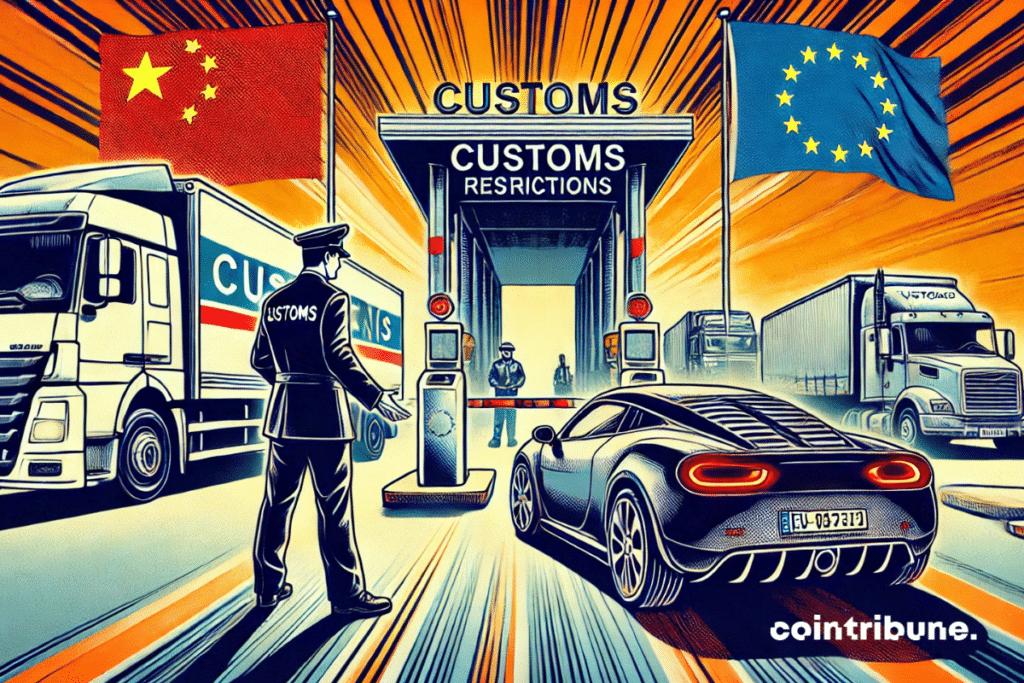Electric Vehicle clash : EU’s tariffs on China head to WTO
In a new escalation of international trade tensions, China has officially filed a complaint against the European Union with the World Trade Organization (WTO). This move follows the EU’s decision to impose significant tariffs, ranging from 8 % to 35 %, on electric vehicles imported from China. According to the European Union, these taxes aim to correct what is perceived as unfair competition due to Chinese state subsidies. In response to this measure, China retaliates and denounces an infringement of free trade principles. This conflict arises as both economic powers attempt to position themselves as global leaders in ecological transition and technological innovation.

The imposition of tariffs by the EU : an act of protectionism ?
When the European Union announced, after a year-long investigation, tariffs ranging from 8 % to 35 % on electric vehicles imported from China, Beijing’s reaction was swift. To justify its decision, Brussels cited an investigation revealing that Chinese manufacturers of electric vehicles were benefiting from state subsidies deemed “harmful” to European competitiveness. According to European authorities, these subsidies distort the rules of the game to the detriment of European manufacturers, who struggle to compete on cost against Chinese models massively supported by the state.
The tariffs are thus intended to level what the EU perceives as an imbalance. In an official statement, the EU specified its need to “protect its market and jobs against practices considered unfair,” and emphasizes that Chinese subsidies directly threaten Europe’s ecological transition ambitions. The measures particularly target renowned brands in China, but affect the entire automotive ecosystem, including supply chains that provide essential parts to European manufacturers.
The counterattack from China: towards a standoff at the WTO
Faced with this escalation, China has quickly responded through an official procedure with the WTO. It is seeking a consultation with the EU, the first step before a potential arbitration procedure. “To protect the interests of the electric vehicle industry and promote a fair global ecological transformation, China has decided to challenge the EU’s anti-dumping measures,” announced the Chinese Ministry of Commerce. Chinese authorities denounce a protectionist decision that, according to them, harms the global EV industry, even though both powers have advocated for cooperation in the field of energy transition.
This procedure at the WTO may, however, face legal hurdles, as the appellate body of the institution is currently paralyzed due to internal disagreements, particularly caused by the United States. However, China and the EU have an alternative with the MPIA system, a temporary resolution mechanism that could allow them to find a solution without waiting for a revamp of the WTO system.
The trade dispute between China and the EU over electric vehicles could either de-escalate through diplomatic means or escalate, thereby affecting bilateral relations and the renewable energy sector as a whole. If negotiations were to succeed, both parties could avoid destabilizing their respective markets and preserve their efforts in energy transition. However, if the dispute persists, it could slow global ecological ambitions, but also deepen mistrust between the powers, and hinder exchanges and innovations in a sector that is crucial for the future.
Maximize your Cointribune experience with our "Read to Earn" program! For every article you read, earn points and access exclusive rewards. Sign up now and start earning benefits.
Diplômé de Sciences Po Toulouse et titulaire d'une certification consultant blockchain délivrée par Alyra, j'ai rejoint l'aventure Cointribune en 2019. Convaincu du potentiel de la blockchain pour transformer de nombreux secteurs de l'économie, j'ai pris l'engagement de sensibiliser et d'informer le grand public sur cet écosystème en constante évolution. Mon objectif est de permettre à chacun de mieux comprendre la blockchain et de saisir les opportunités qu'elle offre. Je m'efforce chaque jour de fournir une analyse objective de l'actualité, de décrypter les tendances du marché, de relayer les dernières innovations technologiques et de mettre en perspective les enjeux économiques et sociétaux de cette révolution en marche.
The views, thoughts, and opinions expressed in this article belong solely to the author, and should not be taken as investment advice. Do your own research before taking any investment decisions.